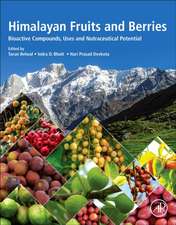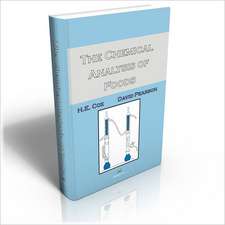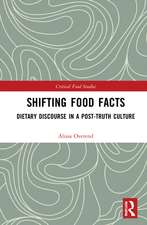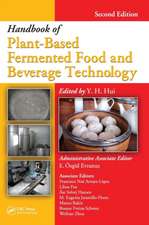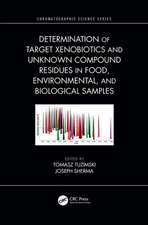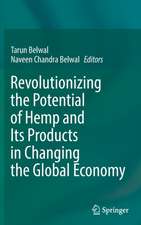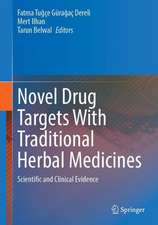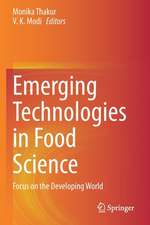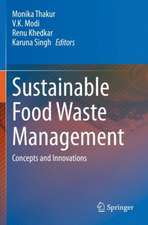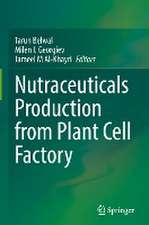Bioactive Components: A Sustainable System for Good Health and Well-Being
Editat de Monika Thakur, Tarun Belwalen Limba Engleză Paperback – 2 dec 2023
The first section starts with introduction of bioactive components consisting of seven different chapters primarily focusing on the bioactive components and their sources with respective health benefits. The second section, comprising five different chapters, deals with different technological trends, regulations, and safety aspects of bioactive components.
With eight chapters, the third section covers the role of bioactive components in human health and the role of functional foods in combating various health-related issues. The fourth section reviews functional foods through six chapters that cover the use of bioactive components in various food products.
The book will prove useful to advanced food technology graduate and undergraduate students and research scholars, practicing food technologists in food and related industries, entrepreneurs, food-pharma researchers, and other scientists seeking information about smart and sustainable processes as well as information needed to design and develop these processes.
| Toate formatele și edițiile | Preț | Express |
|---|---|---|
| Paperback (1) | 1124.30 lei 43-57 zile | |
| Springer Nature Singapore – 2 dec 2023 | 1124.30 lei 43-57 zile | |
| Hardback (1) | 1130.59 lei 43-57 zile | |
| Springer Nature Singapore – 2 dec 2022 | 1130.59 lei 43-57 zile |
Preț: 1124.30 lei
Preț vechi: 1371.09 lei
-18% Nou
Puncte Express: 1686
Preț estimativ în valută:
215.14€ • 225.19$ • 179.06£
215.14€ • 225.19$ • 179.06£
Carte tipărită la comandă
Livrare economică 31 martie-14 aprilie
Preluare comenzi: 021 569.72.76
Specificații
ISBN-13: 9789811923685
ISBN-10: 981192368X
Ilustrații: XXXI, 609 p. 1 illus.
Dimensiuni: 155 x 235 mm
Greutate: 0.89 kg
Ediția:1st ed. 2023
Editura: Springer Nature Singapore
Colecția Springer
Locul publicării:Singapore, Singapore
ISBN-10: 981192368X
Ilustrații: XXXI, 609 p. 1 illus.
Dimensiuni: 155 x 235 mm
Greutate: 0.89 kg
Ediția:1st ed. 2023
Editura: Springer Nature Singapore
Colecția Springer
Locul publicării:Singapore, Singapore
Cuprins
Chapter 1. Introduction on Bioactive Compounds: Sources, Potential and Applications.- Chapter 2. Plant Based Bioactive Components - Phytochemicals: A Review.- Chapter 3. Animal based bioactive components -Zoochemicals: a comprehensive review.- Chapter 4. Marine bioactive components: a sustainable system for good health and well-being.- Chapter 5. Mushroom based bioactive components: sources, applications & sustainability.- Chapter 6. Algal bioactive components – Sources, Health benefits and Sustainability.- Chapter 7. Microbial bioactive components: sources, applications and sustainability.- Chapter 8. Extraction and Characterization of Bioactive Compounds From Different Sources.- Chapter 9. Bioavailability of Bioactive Components and Safety Aspects.- Chapter 10. Regulatory Aspects of Nutraceuticals and Functional Foods in India.- Chapter 11. Good Manufacturing Practices and Safety Issues in Functional Foods and Nutraceuticals.- Chapter 12. Effect of processing on the functional potential of Bioactive components.- Chapter 13. Role of bioactive components in Psychosomatic Disorders.- Chapter 14. Role of Functional Foods in Human health & Disease prevention.- Chapter 15. Functional Foods and Nutraceuticals for Maternal Health.- Chapter 16. Importance of Functional foods in Child Development: A Review.- Chapter 17. Bioactive components having anti-microbial & anti-cancerous properties: a review.- Chapter 18. Role of Functional Foods in Cardiovascular Disease prevention.- Chapter 19. Role of Bioactive Compounds in Hormonal Bio-regulation.- Chapter 20. Bioactive Components for Ocular Health.- Chapter 21. Nutrigenomics research: A review.- Chapter 22. Fortification of Bioactive Components for The Development of Functional Foods.- Chapter 23. Biotechnological tools for extraction, identification, and detection of bioactive compounds.- Chapter 24. Strategy and approaches of Extraction of Natural Bioactive compounds and Secondary metabolites from Plant sources.- Chapter 25. Microencapsulation of Bioactive Components for Applications in Food Industry.- Chapter 26. Innovative and sustainable techniques for the development of functional foods.- Chapter 27. Novel bioactive compounds for enhancing micronutrient bioavailability.- Chapter 28. Microgreens: an Emerging and Sustainable Innovative approach for functional properties.- Chapter 29. Traditional food adjuncts: Sustainable & Healthy option for Functional foods.- Chapter 30. Functional Fermented Foods.- Chapter 31. Extraction and use of bioactive components from underutilized horticultural crops.- Chapter 32. Sustainable Functional food system: Key to Achieve Sustainable Development Goal 3.- Chapter 33. Non-Thermal processing techniques for the extraction of bioactive components of food.- Chapter 34. Physico-chemical Properties and Antioxidant Potential of Curry Leaf Chutney Powder: A Traditional Functional Food Adjunct.
Notă biografică
Dr. Monika Thakur works as an Associate Professor at the Amity Institute of Food Technology, Amity University, Uttar Pradesh, India. She is currently engaged in the development of functional foods, extraction of bioactive components, fungal functional potential, and bio-colorants. She was awarded a PhD in 2006 by Himachal Pradesh University. She is a double gold medalist (MSc and MPhil) and has received several prestigious awards such as Himalayan Research Scholar Association Award (2007); Young Scientist Award, IITT 2020; Best Speaker Award (2020, 2021); and Young Researcher Award (2021). Apart from her teaching assignments, she has been involved in various research and extension activities. So far, she has published more than 70 publications, holds patents and copyrights, and has 6 books to her credit. She has completed two industrial projects and is currently involved in a DST-sanctioned project.
Dr. Tarun Belwal, working in the Department of Drug Scienceand Technology, University of Turin, Italy, is exploring food science, waste valorization, plant nutraceutical potential, and human health, including the effect of food bioprocess techniques on its quality and other functional attributes. He is currently engaged in the development and promotion of safer and greener food bioprocess techniques and valorization of food waste. Previously, Dr. Belwal worked at the College of Biosystems Engineering and Food Science, Zhejiang University, China. Dr. Belwal received his PhD (Plant Biotechnology) from Kumaun University, Uttarakhand, India, collaborating with G.B. Pant National Institute of Himalayan Environment (NIHE), Uttarakhand, India. So far he has edited 3 books, published more than 100 international peer-reviewed research articles, and authored 14 book chapters. His research work has been cited more than 2500 times.
Dr. Tarun Belwal, working in the Department of Drug Scienceand Technology, University of Turin, Italy, is exploring food science, waste valorization, plant nutraceutical potential, and human health, including the effect of food bioprocess techniques on its quality and other functional attributes. He is currently engaged in the development and promotion of safer and greener food bioprocess techniques and valorization of food waste. Previously, Dr. Belwal worked at the College of Biosystems Engineering and Food Science, Zhejiang University, China. Dr. Belwal received his PhD (Plant Biotechnology) from Kumaun University, Uttarakhand, India, collaborating with G.B. Pant National Institute of Himalayan Environment (NIHE), Uttarakhand, India. So far he has edited 3 books, published more than 100 international peer-reviewed research articles, and authored 14 book chapters. His research work has been cited more than 2500 times.
Textul de pe ultima copertă
This book compiles updated information about the role and health benefits of various bioactives in food. Different chapters are contributed by academicians, food scientists, technologists, and medical practitioners. The book addresses both theoretical and applied aspects of bioactive components and provides exhaustive knowledge about bioactive components. It comprises 27 chapters organized into 4 major sections covering topics in food science and technology, functional foods, and nutraceuticals. It provides perspectives for innovation, sources, applications, and sustainability in bioactive component research.
The first section starts with introduction of bioactive components consisting of seven different chapters primarily focusing on the bioactive components and their sources with respective health benefits. The second section, comprising five different chapters, deals with different technological trends, regulations, and safety aspects of bioactive components.
With eight chapters, the third section covers the role of bioactive components in human health and the role of functional foods in combating various health-related issues. The fourth section reviews functional foods through six chapters that cover the use of bioactive components in various food products.
The book will prove useful to advanced food technology graduate and undergraduate students and research scholars, practicing food technologists in food and related industries, entrepreneurs, food-pharma researchers, and other scientists seeking information about smart and sustainable processes as well as information needed to design and develop these processes.
The first section starts with introduction of bioactive components consisting of seven different chapters primarily focusing on the bioactive components and their sources with respective health benefits. The second section, comprising five different chapters, deals with different technological trends, regulations, and safety aspects of bioactive components.
With eight chapters, the third section covers the role of bioactive components in human health and the role of functional foods in combating various health-related issues. The fourth section reviews functional foods through six chapters that cover the use of bioactive components in various food products.
The book will prove useful to advanced food technology graduate and undergraduate students and research scholars, practicing food technologists in food and related industries, entrepreneurs, food-pharma researchers, and other scientists seeking information about smart and sustainable processes as well as information needed to design and develop these processes.
Caracteristici
Covers the role of functional foods in combating various health-related issues Discusses technological trends, regulations, and safety aspects of bioactive components Includes bioactive components, their sources, and their health benefits



